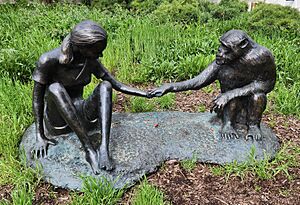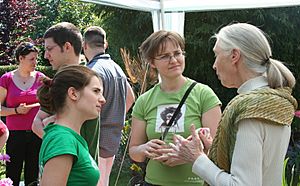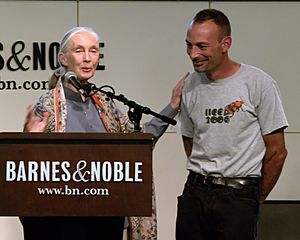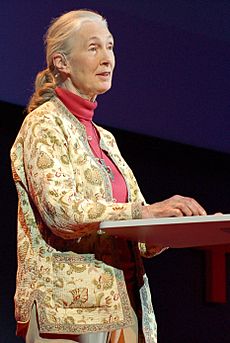Jane Goodall facts for kids
Quick facts for kids
Jane Goodall
|
|
|---|---|
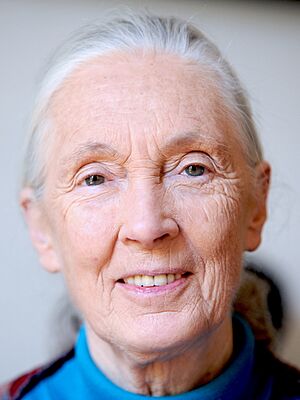
Goodall in 2010
|
|
| Born |
Valerie Jane Morris-Goodall
3 April 1934 London, England
|
| Died | 1 October 2025 (aged 91) Los Angeles, California, U.S.
|
| Education | |
| Known for |
|
| Spouse(s) |
|
| Children | 1 |
| Awards |
|
| Scientific career | |
| Fields | Ethology |
| Thesis | Behaviour of Free-Living Chimpanzees (1966) |
| Doctoral advisor | Robert Hinde |
| Signature | |
Dame Jane Goodall was a famous English primatologist and anthropologist. She was born as Valerie Jane Morris-Goodall on April 3, 1934, and passed away on October 1, 2025. Many people considered her the world's top expert on chimpanzees. She spent over 60 years studying how wild chimpanzees live and interact with their families. Goodall first traveled to Gombe Stream National Park in Tanzania in 1960 to observe these amazing animals.
Jane Goodall founded the Jane Goodall Institute and the Roots & Shoots program. She worked tirelessly to protect animals and their homes. She was also a United Nations Messenger of Peace starting in April 2002. Goodall was an honorary member of the World Future Council.
Contents
Her Early Life and Dream
Valerie Jane Morris-Goodall was born in April 1934 in Hampstead, London. Her father, Mortimer Herbert Morris-Goodall, was a businessman. Her mother, Margaret Myfanwe Joseph, was a novelist.
When Jane was a child, her father gave her a stuffed toy chimpanzee named Jubilee. This toy was a special gift instead of a teddy bear. Goodall often said that her love for Jubilee sparked her early passion for animals. She mentioned that her mother's friends were surprised by the toy, thinking it might scare her. Jubilee still sits on Goodall's dresser in London today.
Journey to Africa
Jane Goodall always felt a strong connection to animals and Africa. In 1957, this passion led her to a friend's farm in Kenya. There, she found work as a secretary. Following her friend's advice, she called Louis Leakey, a famous Kenyan archaeologist. She simply wanted to talk about animals. Leakey, however, had a bigger idea. He believed that studying living great apes could teach us about early human behavior. He was looking for someone to research chimpanzees.
Starting Research in Gombe
In 1958, Leakey sent Goodall to London. She studied primate behavior and anatomy there. Leakey then helped raise money for her research. On July 14, 1960, Goodall arrived at Gombe Stream National Park in Tanzania. She was one of the first of what would be called The Trimates, a group of women who pioneered primate studies. Her mother joined her because the chief warden was worried about their safety. Goodall often said her mother encouraged her to pursue a career in primatology, which was mostly a male field back then. Her groundbreaking work helped open the field to many more women.
Studying at Cambridge
In 1962, Leakey arranged for Goodall to study at the University of Cambridge. She did not have a college degree yet. She was only the eighth person allowed to study for a PhD at Cambridge without a bachelor's degree first. She earned her Bachelor of Arts degree in natural sciences by 1964. Later that year, she began her Doctor of Philosophy degree in ethology (the study of animal behavior). She finished her thesis in 1966. It was about the "Behaviour of free-living chimpanzees" and covered her first five years of study at Gombe.
In 2006, the Open University of Tanzania gave her an honorary Doctor of Science degree.
Amazing Discoveries at Gombe
Goodall began studying chimpanzee social and family life in 1960. She focused on the Kasakela chimpanzee community in Gombe Stream National Park. She discovered that "it isn't only human beings who have personality." She also found that chimpanzees can think rationally and feel emotions like joy and sorrow. She observed them hugging, kissing, patting each other, and even tickling. These are actions we often think of as only "human." Goodall believed these gestures showed the strong, loving bonds between family members and others in their community. These bonds could last for over 50 years.
Chimpanzees Use Tools!
Goodall's research at Gombe challenged two big ideas of her time. People believed that only humans could make and use tools. They also thought chimpanzees were vegetarians. One day, she watched a chimpanzee eating at a termite mound. The chimp repeatedly put grass stalks into termite holes. Then, it pulled them out covered with termites, like "fishing." Chimpanzees also took twigs from trees and stripped off the leaves. This made the twig more effective, a basic form of toolmaking. Humans had always defined themselves as "Man the Toolmaker." After Goodall's amazing findings, Louis Leakey famously said, "We must now redefine man, redefine tool, or accept chimpanzees as human!"
Chimpanzee Social Life and Hunting
Goodall also observed that chimpanzees could be aggressive and violent. She saw dominant female chimpanzees sometimes kill the young of other females. This helped them keep their high position in the group. Sometimes, they even ate the young. Goodall said that for the first ten years, she thought Gombe chimpanzees were "nicer than human beings." But then she found they "could be brutal—that they, like us, had a darker side to their nature."
She wrote about aggressive interactions between chimpanzee groups in her 1990 book, Through a Window. Her discoveries changed what people knew about chimpanzee behavior. They also showed how similar humans and chimpanzees can be.
Goodall also saw chimpanzees hunt and eat smaller primates, like colobus monkeys. This was another big scientific discovery. It changed earlier ideas about what chimpanzees eat and how they behave.
Naming the Chimpanzees
Goodall did something different from other researchers. Instead of giving numbers to the animals she studied, she gave them names. At the time, most scientists used numbers. They thought this would prevent them from getting too attached and losing their scientific objectivity. Goodall wrote in 1993 that she was criticized for using words like 'childhood' or 'personality' for chimpanzees. People thought she was giving human traits to animals.
But by naming them, she formed close bonds with the chimpanzees. She even became the only human ever accepted into chimpanzee society.
Some of the chimpanzees Goodall named were:
- David Greybeard: A male chimp with a grey chin who was the first to trust Goodall.
- Goliath: A friend of David Greybeard, known for his bold nature.
- Mike: A clever chimp who became the leader.
- Flo: A motherly, high-ranking female with a unique nose and ears. Her children included Figan, Faben, Freud, Fifi, and Flint.
- Frodo: Fifi's second-oldest child, an aggressive male who sometimes attacked humans, including Goodall.
Protecting Chimpanzees and Our Planet
In 1977, Goodall started the Jane Goodall Institute (JGI). This institute supports the Gombe research. It also leads efforts to protect chimpanzees and their homes around the world. The JGI has offices in many countries. It is known for its community-focused conservation programs in Africa.
Roots & Shoots Program
The JGI's global youth program, Roots & Shoots, began in 1991. It started when 16 teenagers met with Goodall in Tanzania. They wanted to talk about problems they saw in their communities and the environment. By 2010, the organization had over 10,000 groups in more than 100 countries.
Helping Orphaned Chimpanzees
In 1992, Goodall founded the Tchimpounga Chimpanzee Rehabilitation Centre in the Republic of the Congo. This center cares for chimpanzees whose parents were lost due to the bush-meat trade. The sanctuary now houses over a hundred chimps on its three islands.
In 1994, Goodall started the Lake Tanganyika Catchment Reforestation and Education (TACARE) project. This project protects chimpanzee habitats from deforestation. It does this by planting trees around Gombe National Park. It also teaches local communities about sustainable living and farming. The TACARE project helps young girls too. It offers them health education and scholarships for college.
Goodall spent almost all her time advocating for chimpanzees and the environment. She traveled nearly 300 days a year. She was also on the advisory council for Save the Chimps, the world's largest chimpanzee sanctuary outside of Africa.
Jane's Beliefs and Books
Goodall's focus shifted from just observing chimps to protecting them after a conference in 1986. She became a strong advocate for animal-human conservation. She was a vegetarian and later a vegan. She promoted this diet for ethical, environmental, and health reasons. She believed that farm animals are "far more aware and intelligent than we ever imagined." She felt they deserved our respect and help.
Goodall was also a vocal environmental advocate. She spoke about how climate change affects endangered species like chimpanzees. She worked with NASA to use satellite images to help stop deforestation in Western Africa. This project helped local communities learn how to protect their environment. In 2000, she co-founded Ethologists for the Ethical Treatment of Animals. This group ensures animals are treated well during scientific studies.
Thoughts on Mysterious Creatures
Goodall was open to the idea that undiscovered primate species might exist. This included creatures like Sasquatch or Bigfoot. She discussed this in interviews. In 2012, she said she was "fascinated" and "would actually love them to exist." She acknowledged it was strange that no real evidence had been found, but she had read many stories.
Her Spiritual Journey
Jane Goodall grew up in a Christian family. She believed in a great spiritual power. She felt this power most strongly when she was in nature. She described it as "something that's bigger and stronger than what I am or what anybody is." She saw no conflict between evolution and belief in God.
Seeds of Hope Book
In 2013, Goodall wrote Seeds of Hope with Gail Hudson. This book explored the important role of trees and plants. The book's release was delayed because some parts were found to be copied without proper credit. Goodall apologized and explained it was due to "chaotic note taking." She worked with her team to fix the issues. The book was released in 2014 after being reviewed and updated with many new notes.
Her Personal Life and Legacy
Goodall was married twice. In 1964, she married wildlife photographer Baron Hugo van Lawick. They had a son, Hugo (b. 1967), and later divorced in 1974. In 1975, she married Derek Bryceson, who was a member of Tanzania's parliament and director of its national parks. Bryceson passed away in 1980. His position helped protect Goodall's research at Gombe.
Goodall loved dogs and said they were her favorite animal. She had prosopagnosia, which made it hard for her to recognize faces. She lived in Bournemouth.
Goodall passed away peacefully on October 1, 2025, in Los Angeles, California, at the age of 91. She was on a speaking tour in the United States. Many people shared tributes after her death. Prince Harry, Duke of Sussex and Meghan, Duchess of Sussex, called her "a visionary humanitarian, scientist, friend to the planet, and friend to us." Actor Leonardo DiCaprio said, "Today we have lost a true hero for the planet, an inspiration to millions, and a dear friend.” António Guterres, Secretary-General of the United Nations, thanked her for her "lifelong environmental protection efforts."
Awards and Recognition
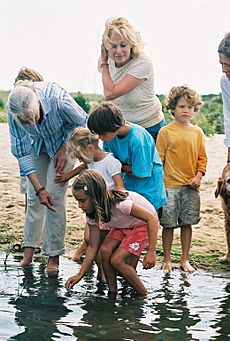
Jane Goodall received many awards for her work. In 2003, she was made a Dame Commander of the Order of the British Empire (DBE) for her work in the environment and conservation. This is a very high honor in the UK. In 2002, she became a United Nations Messenger of Peace. Other awards included the Kyoto Prize from Japan, the French Legion of Honour, and the Presidential Medal of Freedom from the U.S. President Joe Biden in January 2025.
The Walt Disney Company honored Goodall with a plaque on the Tree of Life at Disney's Animal Kingdom theme park. It included a carving of David Greybeard, the first chimpanzee to approach her at Gombe. In 2019, Time magazine named her one of the 100 most influential people in the world. In 2021, she received the Templeton Prize. In 2022, she received the Stephen Hawking Medal for Science Communication. In April 2023, she was awarded as an Officer in the Order of Orange-Nassau in the Netherlands. In October 2024, she gave an inspiring speech at UNESCO about conservation and protecting our planet.
Books by Jane Goodall
- 1969: My Friends the Wild Chimpanzees.
- 1971: In the Shadow of Man.
- 1986: The Chimpanzees of Gombe: Patterns of Behavior.
- 1990: Through a Window: 30 Years Observing the Gombe Chimpanzees.
- 1999: Reason for Hope: A Spiritual Journey.
- 2000: 40 Years at Gombe.
- 2005: Harvest for Hope: A Guide to Mindful Eating.
- 2009: Hope for Animals and Their World: How Endangered Species Are Being Rescued from the Brink.
- 2013: Seeds of Hope: Wisdom and Wonder from the World of Plants.
- 2021: The Book of Hope.
Books for Kids
- 1972: Grub: The Bush Baby.
- 1988: My Life with the Chimpanzees.
- 1989: The Chimpanzee Family Book.
- 1989: Jane Goodall's Animal World: Chimps.
- 1994: With Love.
- 1999: Dr. White.
- 2000: The Eagle & the Wren.
- 2001: Chimpanzees I Love: Saving Their World and Ours.
- 2004: Rickie and Henri: A True Story.
Films About Jane Goodall
Jane Goodall has been the subject of more than 40 films, including:
- 1965: Miss Goodall and the Wild Chimpanzees.
- 1984: Among the Wild Chimpanzees.
- 1990: The Life and Legend of Jane Goodall.
- 2002: Jane Goodall's Wild Chimpanzees (IMAX).
- 2012: Chimpanzee (Disneynature).
- 2017: Jane (National Geographic Studios).
- 2020: Jane Goodall: The Hope (National Geographic Studios).
- 2023: Jane Goodall: Reasons for Hope (IMAX).
See also
 In Spanish: Jane Goodall para niños
In Spanish: Jane Goodall para niños
- Animal faith
- Birutė Galdikas – Another of The Trimates who studied orangutans.
- Dian Fossey – Another of The Trimates who studied gorillas.
- List of animal rights advocates
- Nonhuman Rights Project
- Timeline of women in science
- USC Jane Goodall Research Center
- Washoe
 | Janet Taylor Pickett |
 | Synthia Saint James |
 | Howardena Pindell |
 | Faith Ringgold |


